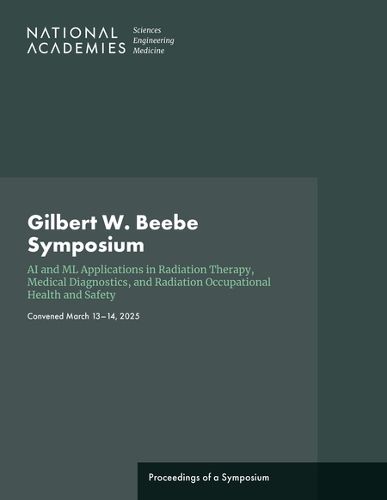Readings Newsletter
Become a Readings Member to make your shopping experience even easier.
Sign in or sign up for free!
You’re not far away from qualifying for FREE standard shipping within Australia
You’ve qualified for FREE standard shipping within Australia
The cart is loading…






On March 13-14, 2025, the Nuclear and Radiation Studies Board of the National Academies of Sciences, Engineering, and Medicine hosted the most recent Gilbert W. Beebe symposium, with the goal of discussing the applications of artificial intelligence (AI) and machine learning (ML) in the fields of radiation therapy, medical diagnostics, and occupational health and safety. Among other topics, symposium participants discussed the importance of data for AI readiness, multimodal modeling, digital twins, uncertainty quantification and trustworthiness, and bias and ethics as it applies to each of these fields.
The Gilbert W. Beebe Symposium was established by the Board on Radiation Effects Research (a predecessor of the Nuclear and Radiation Studies Board) in 2002 to honor the scientific achievements of the late Dr. Gilbert W. Beebe, a distinguished National Cancer Institute radiation epidemiologist who was one of the designers and key implementers of the epidemiology studies of Japanese atomic bomb survivors and a co-founder of the Medical Follow-up Agency. The symposium is used to promote discussions among scientists, federal staff, and other interested parties concerned with radiation health effects.
Table of Contents
Front Matter 1 Introduction 2 Insights from the Artificial Intelligence Field 3 The Potential for Use of Artificial Intelligence in Radiation Health Fields 4 Data for Artificial Intelligence Readiness 5 Digital Twins 6 Multimodal Applications of Artificial Intelligence 7 Bias, Ethics, and Regulatory Issues 8 Trustworthiness and Transparency in Artificial Intelligence 9 Final Remarks Appendix A: Symposium Agenda Appendix B: Biographies
$9.00 standard shipping within Australia
FREE standard shipping within Australia for orders over $100.00
Express & International shipping calculated at checkout
Stock availability can be subject to change without notice. We recommend calling the shop or contacting our online team to check availability of low stock items. Please see our Shopping Online page for more details.
On March 13-14, 2025, the Nuclear and Radiation Studies Board of the National Academies of Sciences, Engineering, and Medicine hosted the most recent Gilbert W. Beebe symposium, with the goal of discussing the applications of artificial intelligence (AI) and machine learning (ML) in the fields of radiation therapy, medical diagnostics, and occupational health and safety. Among other topics, symposium participants discussed the importance of data for AI readiness, multimodal modeling, digital twins, uncertainty quantification and trustworthiness, and bias and ethics as it applies to each of these fields.
The Gilbert W. Beebe Symposium was established by the Board on Radiation Effects Research (a predecessor of the Nuclear and Radiation Studies Board) in 2002 to honor the scientific achievements of the late Dr. Gilbert W. Beebe, a distinguished National Cancer Institute radiation epidemiologist who was one of the designers and key implementers of the epidemiology studies of Japanese atomic bomb survivors and a co-founder of the Medical Follow-up Agency. The symposium is used to promote discussions among scientists, federal staff, and other interested parties concerned with radiation health effects.
Table of Contents
Front Matter 1 Introduction 2 Insights from the Artificial Intelligence Field 3 The Potential for Use of Artificial Intelligence in Radiation Health Fields 4 Data for Artificial Intelligence Readiness 5 Digital Twins 6 Multimodal Applications of Artificial Intelligence 7 Bias, Ethics, and Regulatory Issues 8 Trustworthiness and Transparency in Artificial Intelligence 9 Final Remarks Appendix A: Symposium Agenda Appendix B: Biographies